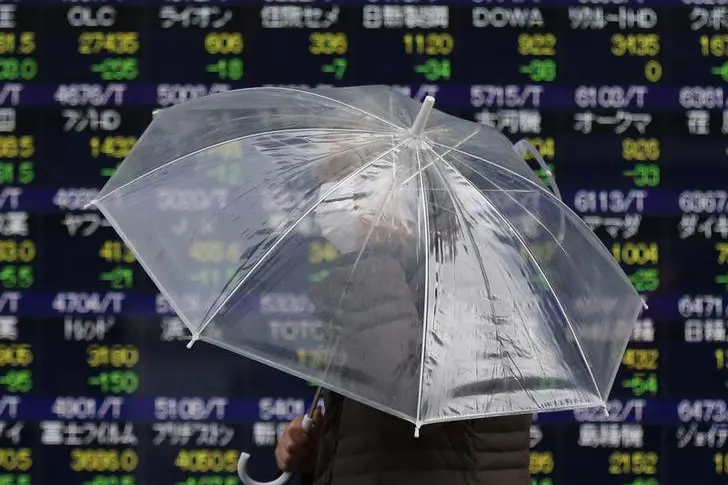PHOTO
- Asian shares rise, tracking a surge on Wall Street on Friday
- Oil prices edge lower, Brent stays above $70
- Abu Dhabi’s index gains 2.4 percent, outperforms the region
- Dollar and gold prices edge lower
Global markets
Asian shares were trading near nine-month highs on Monday after the United States Treasury Secretary Steven Mnuchin said a U.S.-China trade agreement would go “way beyond” previous efforts to open China’s markets to U.S. companies and hoped that the two sides were “close to the final round” of negotiations.
MSCI’s broadest index of Asia-Pacific shares outside Japan climbed 0.6 percent to its highest since late July. Chinese shares led the growth with the blue-chip CSI300 index rising 2.2 percent.
Friday on Wall Street, the Dow jumped 1 percent, the S&P500 climbed 0.7 percent and the Nasdaq added 0.5 percent. [.N] JPMorgan analysts were less confident this share euphoria could continue, with valuations already sky high.
“We expect a relatively market-friendly U.S.-China deal,” Bank of America Merrill Lynch global economist Ethan Harris said in a note, according to a Reuters report. “In our view, market and political concerns will constrain future fights. Think ‘skirmishes’ rather than ‘major battles.’”
Oil prices
Oil prices edged lower on Monday, but concerns over global supplies kept prices well supported.
Brent crude oil futures were at $71.46 a barrel at 0233 GMT, down 9 cents, or 0.1 percent, from their last close, having hit their highest since November 12 on Friday at $71.87.
U.S. West Texas Intermediate (WTI) crude futures were at $63.63 per barrel, down 26 cents, or 0.4 percent, from their last settlement.
“I would expect oil to trade in a relatively tight band around $70 per for the time being,” Virendra Chauhan, oil analyst at Energy Aspects in Singapore told Reuters, pointing to mixed signals on supply from the United States and OPEC and its allies.
“Leading edge indicators on U.S. supply suggest activity levels are stepping up which is supportive for strong production growth in the second half,” said Chauhan
Middle East markets
Abu Dhabi’s index gained 2.4 percent on Sunday as First Abu Dhabi Bank (FAB) surged by almost 5 percent after it obtained regulatory approval to increase its foreign ownership limit.
Dubai’s index was mainly flat with Emaar Properties’ shares down 1.2 percent.
Saudi Arabia’s index dropped 0.4 percent with Al Rajhi Bank down 0.6 percent and Samba Financial Group down 1.3 percent.
Qatari stocks were down 0.2 percent, pressured by a 0.9 percent drop in market heavyweight Industries Qatar and a 1.3 percent fall in Qatar Insurance Co.
Egypt’s blue-chip index EGX30 dropped 0.2 percent, Kuwait’s premier market index edged 0.1 percent lower while Oman’s index added 0.2 percent and Bahrain’s index gained 0.5 percent.
Currencies
The dollar index, which measures the greenback against a basket of six major currencies, was 0.1 percent weaker at 96.863.
Precious metals
Gold prices fell to a more than one-week low on Monday.
Spot gold edged 0.2 percent lower to $1,288.08 per ounce as of 0330 GMT, having touched $1,286.44, its lowest since April 5, earlier in the session. U.S. gold futures fell 0.3 percent to $1,291 an ounce.
(Reporting by Gerard Aoun; Editing by Mily Chakrabarty)
Our Standards: The Thomson Reuters Trust Principles
Disclaimer: This article is provided for informational purposes only. The content does not provide tax, legal or investment advice or opinion regarding the suitability, value or profitability of any particular security, portfolio or investment strategy. Read our full disclaimer policy here.
© ZAWYA 2019




















